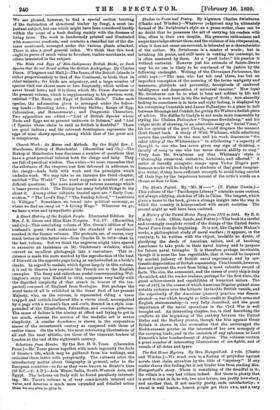Studies in Prose and Poetry. By Algernon Charles Swinburne. (Chatto
and Windus.)—Whatever judgment may be ultimately formed of Mr. Svrinburne's style as a prose-writer, there can be no doubt that he possesses the art of carrying his readers with him, often in their own despite. His generous enthusiasm and ample knowledge attract them, and the violence of his vituperation, when it does not cause amusement, is tolerated as a characteristic of the author. Mr. Swinburne is a master of words ; but in lavishing his praise, and still more in venting his contempt, he is often mastered by them. As a "good hater," his passion is without restraint. However just his estimate of Sainte-Beuve may be, no one is likely to be convinced of its justice by the following onslaught. Writing of the Chronigues Parisiennes, the critic says :—" The man who has not read these, has but an imperfect conception of the meaning of the terms malignity and meanness, platitude and perversity, decrepitude of cankered intelligence and desperation of universal rancour." How loyal Mr. Swinburne can be to what is best and noblest in life and literature, is seen here in his fine eulogy of Scott ; how absurdly lacking he sometimes is in taste and right feeling, is displayed by his consigning Constable and James Ballantyne to a place in hell between Hemings and Condell, for giving Sir Walter a foolish piece of advice. His dislike to Carlyle is not made more reasonable by styling the Chelsea Philospher " Diogenes Devilsdung," and his vulgar mode of showing, in an admirable essay on "Social Verse," his low opinion of the poet Clough, would disgrace the meanest Grub Street hack. A study of Walt Whitman, while admitting certain fine qualities in the man and his work, denounces "the rabid idiocy of the Whitmaniacs " in attributing "a capacity of thought to one who has never given any sign of thinking, a faculty of song to one who has never shown ability to sing." Truly does Mr. Swinburne say that Whitman's style is "thoroughly unnatural, imitative, histrionic, and affected." A series of fervidly eulogistic essays upon Victor Hugo's post- humous works will be helpful to students of that great imagina- tive writer, if they have sufficient strength to avoid being carried off their legs by the impetuous torrent of the critic's words on a theme so dear to him.


































 Previous page
Previous page